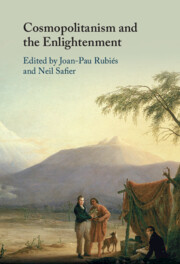Book contents
- Cosmopolitanism and the Enlightenment
- Cosmopolitanism and the Enlightenment
- Copyright page
- Dedication
- Contents
- Figures
- Contributors
- Preface
- Acknowledgments
- Introduction
- 1 Enlightenment Cosmopolitanism in Perspective
- 2 The Cosmopolitan Paradox
- 3 Diderot’s Conjectural History and the History of “Monstrous Nature”
- 4 Geographies of Cosmopolitanism
- 5 The Imperial, Global (Cosmopolitan) Dimensions of Nonelite Colonial Scribal Cultures in the Early Modern Iberian Atlantic
- 6 Gendered Cosmopolitanism?
- 7 Cosmopolitanism and the Creation of Patriotic Identities in the European Enlightenment
- 8 A Cosmopolitanism of Countervailing Powers
- 9 Cosmopolitanism and Civil War
- Afterword
- Index
8 - A Cosmopolitanism of Countervailing Powers
Resistance against Global Domination in the Political Thought of Immanuel Kant and Quobna Ottobah Cugoano
Published online by Cambridge University Press: 16 March 2023
- Cosmopolitanism and the Enlightenment
- Cosmopolitanism and the Enlightenment
- Copyright page
- Dedication
- Contents
- Figures
- Contributors
- Preface
- Acknowledgments
- Introduction
- 1 Enlightenment Cosmopolitanism in Perspective
- 2 The Cosmopolitan Paradox
- 3 Diderot’s Conjectural History and the History of “Monstrous Nature”
- 4 Geographies of Cosmopolitanism
- 5 The Imperial, Global (Cosmopolitan) Dimensions of Nonelite Colonial Scribal Cultures in the Early Modern Iberian Atlantic
- 6 Gendered Cosmopolitanism?
- 7 Cosmopolitanism and the Creation of Patriotic Identities in the European Enlightenment
- 8 A Cosmopolitanism of Countervailing Powers
- 9 Cosmopolitanism and Civil War
- Afterword
- Index
Summary
Global domination – including imperial oppression and commercial exploitation across borders and, especially, across continents – was a key concern for many modern thinkers, and among its roots and its remedies were often thought to be the various forms of antagonism and resistance that fundamentally characterize humans’ social practices and interactions. Unsocially sociable individuals, in this view, are characterized by a seemingly contradictory array of impulses that both draw them together in a spirit of humane association and yet pull them apart, as they seek to resist others either to forestall being dominated themselves or to indulge their prideful and hierarchical sense of superiority. Among the many treatments of what one could call "cosmopolitan unsocial sociability" are the incisive – and complementary – theoretical writings of the 1780s and 1790s respectively by the Afro-British political thinker Quobna Ottobah Cugoano and the Prussian philosopher Immanuel Kant. Kant and Cugoano together exemplify an intriguing and complex strand of Enlightenment thought that viewed global connections as both corrosive to our shared humanity and yet essential for resisting the domination that afflicted both European and non-European peoples.
Information
- Type
- Chapter
- Information
- Cosmopolitanism and the Enlightenment , pp. 239 - 262Publisher: Cambridge University PressPrint publication year: 2023
Accessibility standard: Unknown
Why this information is here
This section outlines the accessibility features of this content - including support for screen readers, full keyboard navigation and high-contrast display options. This may not be relevant for you.Accessibility Information
- 1
- Cited by
